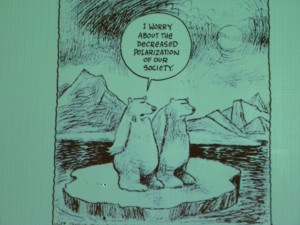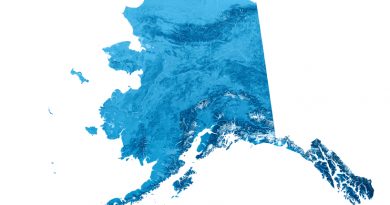Ice-Blog: Climate Change – Arctic in denial?
 If there is one place you would imagine people would have to be conscious of climate change, it would be the Arctic, where the temperature is rising around twice as fast as the global average.
If there is one place you would imagine people would have to be conscious of climate change, it would be the Arctic, where the temperature is rising around twice as fast as the global average.
As I mentioned in the Ice Blog yesterday and in my article on dw.de from here in Tromsö, changes to the sea ice and temperature are altering life rapidly and visibly for people in the high north. So I was intrigued by a side-event here at Arctic Frontiers, which made it clear that this does not necessarily mean people are aware of climate change and what it involves – at least not consciously or actively.
“How to Create a Climate for Change” was the subject of the workshop organised by UArctic, the University of the Arctic. (That is not the same as Tromsö University, which is called Norway’s Arctic University. UArctic is a cooperative network of northern universities and other educational institutions.)
The workshop was looking at awareness of climate change in Norway and other Arctic regions. Kari Marie Norgaard is Professor of Sociology at the University of Oregon in the USA. She spent ten months researching in Bygdaby,a community in northern Norway and told us she had actually monitored an “incredible disconnect between the moral, social, and environmental crisis of climate change and people not realising it is happening.”

This is not limited to the Arctic, although it seems particularly striking in an area undergoing such major changes. There seems to be a widespread paradox in that climate change is leading to dramatic alterations to ecology systems and significant social consequences, but that there is no widespread sense of a need for urgent action.
This is not limited to the Arctic, although it seems particularly striking in an area undergoing such major changes. There seems to be a widespread paradox in that climate change is leading to dramatic alterations to ecology systems and significant social consequences, but that there is no widespread sense of a need for urgent action. Humans, says Norgaard, are “not getting it”. They are carrying on regardless, acting as if nothing were happening.
Denial but not climate scepticism

She speaks of “denial”, but not in the sense that people do not accept that climate change is happening. Norgaard told me she has come under a lot of pressure from the extreme right in the USA, who do not understand her distinction. Her hypothesis is that we know climate change is happening just as we know violence, rape or massacres happen. But we do not perceive it as psychologically disturbing or carrying a moral imperative to act. Norgaard is interested in how and why people collectively resist information about climate change. She focuses on Norway rather than her home country USA because this is a country with a high rate of newspaper readership, high levels of political participation,and where climate change is more visible in the northern region, and people know it is happening.
But in spite of the fact that Bygdaby is highly dependent on farming and tourism, where the climate is important, the fact that the winter had been warm, the snow was two months late and artificial snow had to be used for skiing, did not result in a heightened interest in climate change. In fact, she says, it was invisible in social or political life. One of her conclusions is that people want to protect themselves to some extent and so prefer to live as if climate change was not happening. Her theory is that people don’t want to feel guilty about their lifestyle and also try to avoid fear of the future and feeling helpless.

The greatest communication failure of all time?
Althouth Norgaard did her research in Norway, she says the findings apply equally elsewhere, including the USA, where regions are already experiencing climate impacts with economic consequences, but people don’t want to accept that it could have something to do with their lifestyle and require unpleasant action.
Per Espen Stoknes is Associate Professor at the Center for Climate Strategy of the Norwegian Business Institute NBI. He says surveys going back to 1989 in Norway show a decrease in people’s concern about the greenhouse effect and climate change .Only
4 in 10 see it as a problem and only 8% see it as being of importance. Espen stresses this is not because of a lack of knowledge. In fact, he thinks the better the facts get, the less people care.
Stoknes came up with an interesting figure. Apparently the public has the impression only 55% of climate scientists agree on global warming. In realty, it is 97%.Getting the message about climate change across is the ““Greatest communication failure of all time”, says Stoknes.
Who’s to blame?

Some of the responsibility lies with the scientists in his view. He says scientists need to lecture people less and discuss more. Another problem is that people tend to think of climate as being very distant in time and space. An IPCC estimate for 2100 seems a long way away. For people outside the Arctic, melting sea ice also seems geographically very remote. The same applies to places like Bangladesh or the Maldives.
Stoknes suggestions for improving the situation are not new. But evidently, the message has not got across – or the suggestions proved not effective. He says the media should have less gloom and doom and present more positive stories and examples of practicable action. If only it were that simple.
I remember numerous heated discussions on this topic at a Global Media Forum on Climate Change and the Media in Bonn in 2010, and atvarious other events I was involved in. Communicating climate change in a way that will make people take action in their everyday lives and put pressure on governments to do the same, remains a priority and a challenge.
One idea Stoknes has strikes me as being useful. He stresses the power of social norms to change behaviour, and suggests campaigns that make people compete with their peers – neighbours, other towns, friends, relatives, for being climate-conscious, can be effective. He talked about the success of an app where people can record and compare their energy saving.
Another possibility is to make “greener” options the default, something I was talking further about with some US colleagues today. If the normal way a printer works is to use both sides of the paper, for instance, people will do that. Not though if they have to change a setting
Plenty of food for thought here. The psychological and social dimensions of climate change awareness clearly deserve more consideration.




